🚀 TL;DR
- About 20% of solopreneurs earn between $100K and $300K annually without hiring employees.
- Only ~3.6% of U.S. solopreneurs hit $1M+ in revenue.
- More than 75% of solopreneurs reach profitability in their first year.
- Time management is one of the top operational challenges (≈ 41% report it).
- Many solopreneurs self-fund their start (84% use their own capital), and around half begin with under $5,000 in capital.
The narrative around building businesses has changed dramatically.
I've watched the solopreneur economy evolve since 2005 when I built my first remote business with no employees.
What seemed impossible then is becoming the preferred path for millions today.
If you’re curious about what the state of solopreneurship looks like, here are 10 solopreneur statistics to understand it:
1. Nearly 10 million Americans are self-employed professionals
The Bureau of Labor Statistics shows approximately 9.82 million self-employed professionals in the United States. It's a significant shift in how people approach their careers and build their livelihoods.
I've been saying this for years: solopreneurship isn't a fallback option or a stepping stone. It's a deliberate choice. When you approach it with the right systems and mindset, working for yourself provides unmatched control over your time, work methods, and income potential.
What's encouraging is that you're not alone on this path. Millions of others have already proven this model works, creating abundant opportunities to learn from their experiences and connect with like-minded professionals who understand exactly what you're going through.
2. Over half of solopreneurs have a bachelor's degree or higher
According to Leapmesh's research, 53.2% of solopreneurs have at least a bachelor's degree. This means these solo business owners have specialized knowledge and skills to build successful ventures.
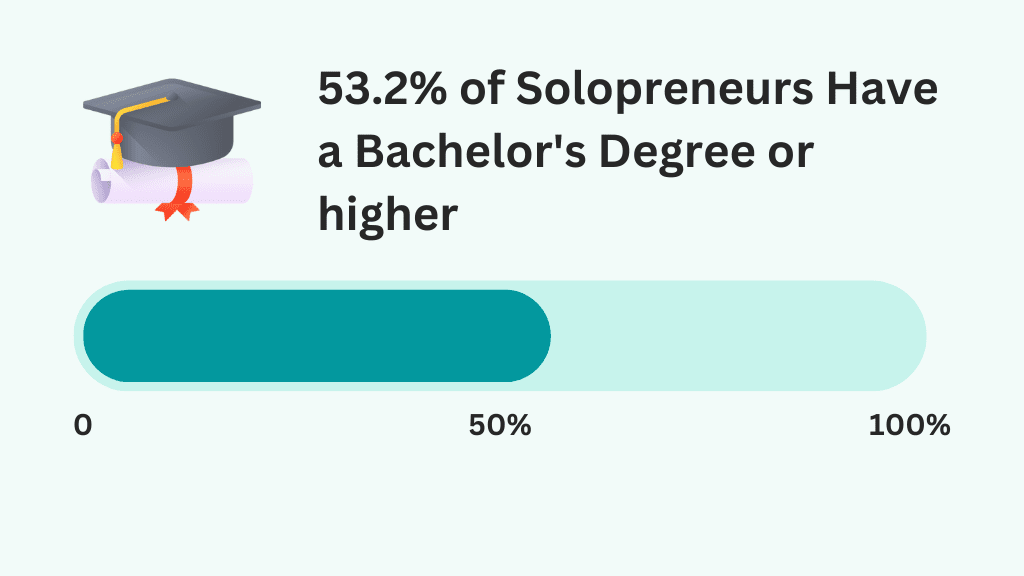
But here's what I find even more interesting—nearly half of successful solopreneurs have built thriving businesses without a four-year degree. This reality confirms what I've seen in my own experience. You need structured systems and focus, and it matters more than credentials.
If you don't have a degree but want to pursue solopreneurship, focus on developing specific expertise through targeted learning. Build systems that create leverage.
Also, your education doesn't need to be formal. It can come through practical experience, mentorship, and self-directed study centered on solving specific problems for specific clients.
3. About half of solopreneurs work from home
The modern workspace has transformed dramatically, with Leapmesh reporting that 51.6% of solopreneurs operate from home.
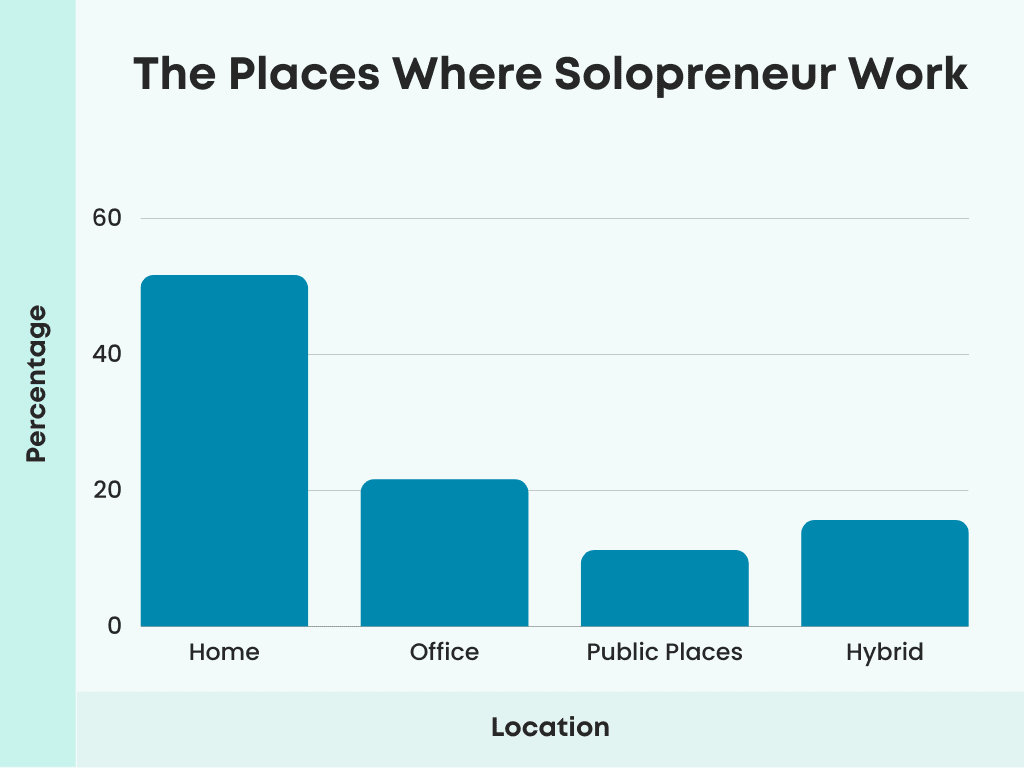
I've been remote since 2005, and I can tell you the home-based model offers great benefits. You reduce overhead, create personalized work environments, and eliminate long commutes.
But it also doesn’t mean working in isolation. You can use a hybrid approach where you work from home and supplement this space with co-working spaces, coffee shops, or occasional travel. This balance creates an ideal environment for high-value work while maintaining human connection.
4. More women are becoming solopreneurs than men
According to Leapmesh and confirmed by the World Economic Forum, women now make up 54.4% of solopreneurs, outnumbering men in this business category.
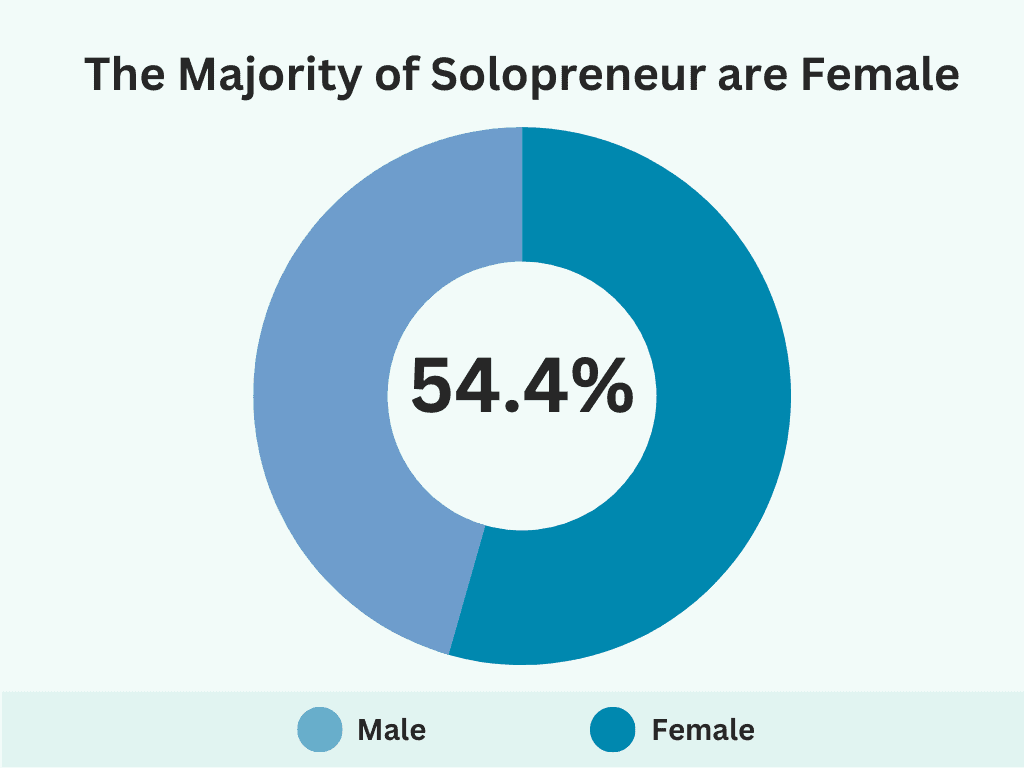
It could be because more women are getting educated or preferring more flexible lifestyles. Other than that, access to the internet and the ability to work from home has only fueled this trend. According to the World Economic Forum, here are a few reasons why women choose to become solopreneurs:
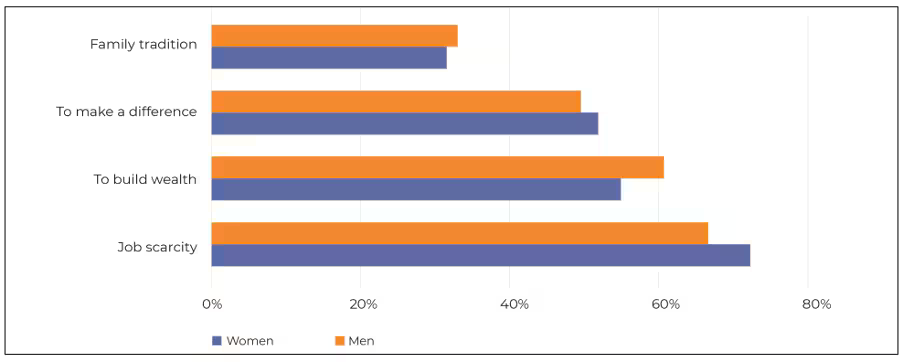
I see this as an indicator that solopreneurship creates more inclusive economic opportunities.
When we eliminate traditional corporate barriers and emphasize outcomes over face time, more people can succeed based on the value they create.
5. Most solopreneurs choose self-employment to be their own boss
The driving force behind solopreneurship isn't primarily financial—it's about autonomy.
QuickBooks research shows that 52% of solopreneurs chose self-employment because they wanted to be their own boss. They want control over their work more than the money they earn.
This matches what I've observed through years of mentoring solopreneurs. I’ve always said that passion powers profits because everyone desires to do more meaningful work.
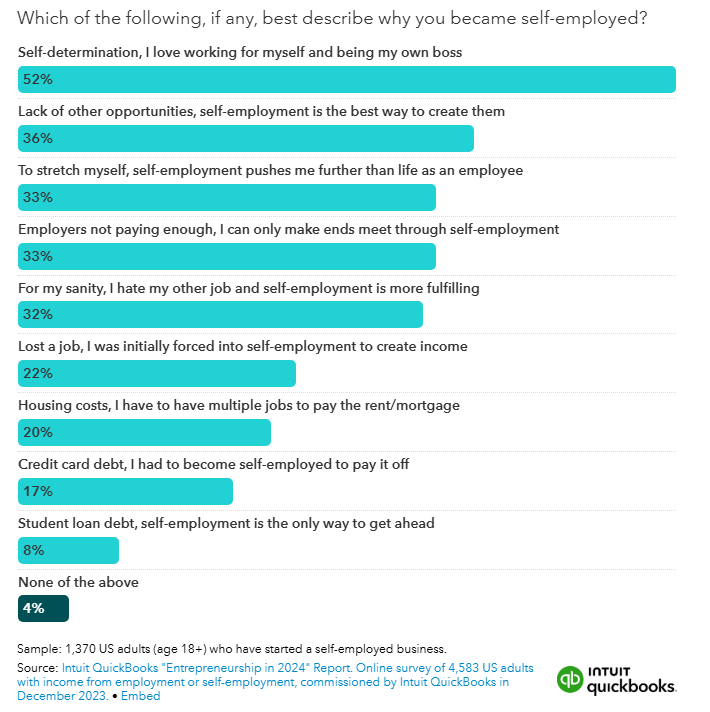
Many solopreneurs maintain day jobs while building independent businesses, especially in the early stages. The same QuickBooks study found that 82% of those who maintain employment while running a side business do so for the stability of a regular paycheck. It's a great way to test the waters before committing fully.
6. Solopreneurs work fewer hours but experience higher stress levels
Despite the freedom of self-employment, QuickBooks research reveals an interesting paradox. Solopreneurs work fewer hours (averaging 40 hours weekly compared to 45 for employers) and take more vacation days (15 days versus 14). However, they report significantly higher stress levels than business owners with employees.
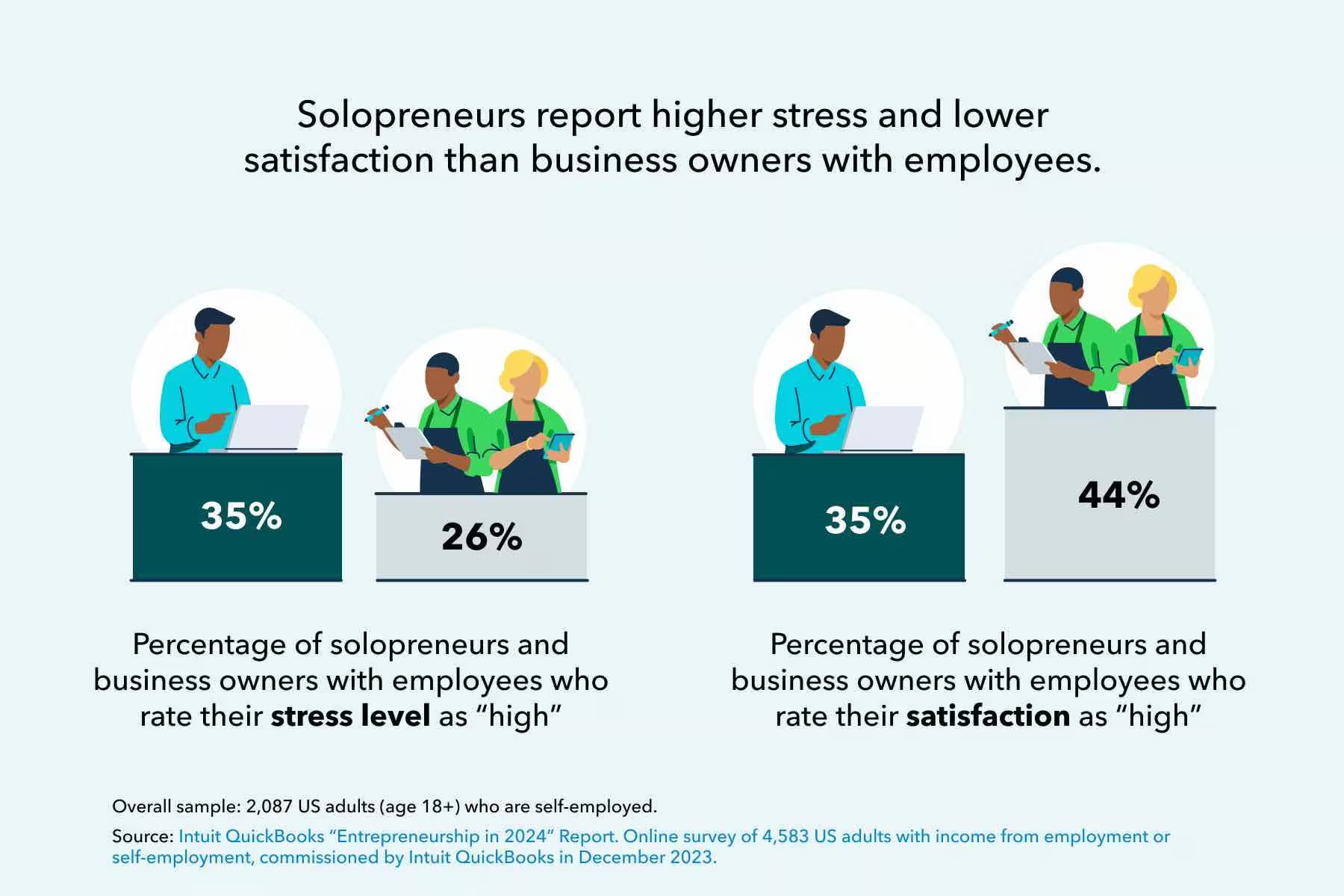
While having complete ownership creates freedom, it also means carrying the full weight of responsibility alone.
In my experience, this stress often stems from lacking proper systems and boundaries. Solopreneurs prefer doing everything themselves, but without the right processes, it can become challenging to do so. You can delegate, automate, or at least eliminate low-value tasks.
7. Solopreneurs need to earn $219,000 in 2024 to feel financially successful
According to QuickBooks' survey, solopreneurs report needing to earn an average of $219,000 annually to feel financially successful. This shows they're ambitious but realistic about how much they need to take home and live comfortably.
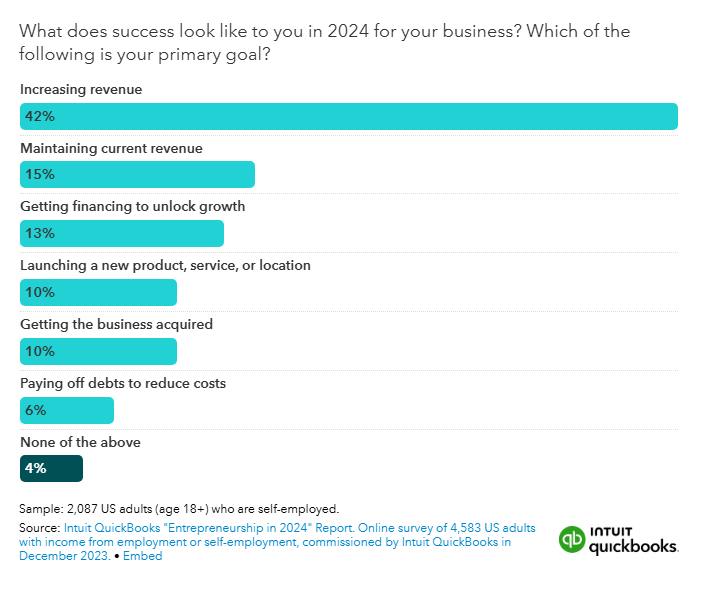
Also, over half (53%) believe they need to earn at least $100,000 to feel successful, yet 65% estimate their current net worth at less than that amount. Honestly, how much you need to earn depends on your lifestyle, cost of living, and general needs.
If you want to ensure you hit your goals, focus on profits, leverage, and lifestyle design over raw income numbers.
A $150,000 business with minimal overhead, strategic systems, and excellent work-life balance often creates more real value than a $300,000 business that requires constant attention and generates stress.
8. One out of five solopreneurs earns between $100K to $300K annually without help
Leapmesh research shows that 20% of solopreneurs—one in five—earn between $100,000 and $300,000 annually without hiring employees or contractors. It goes to show what’s possible with the solopreneur business model.
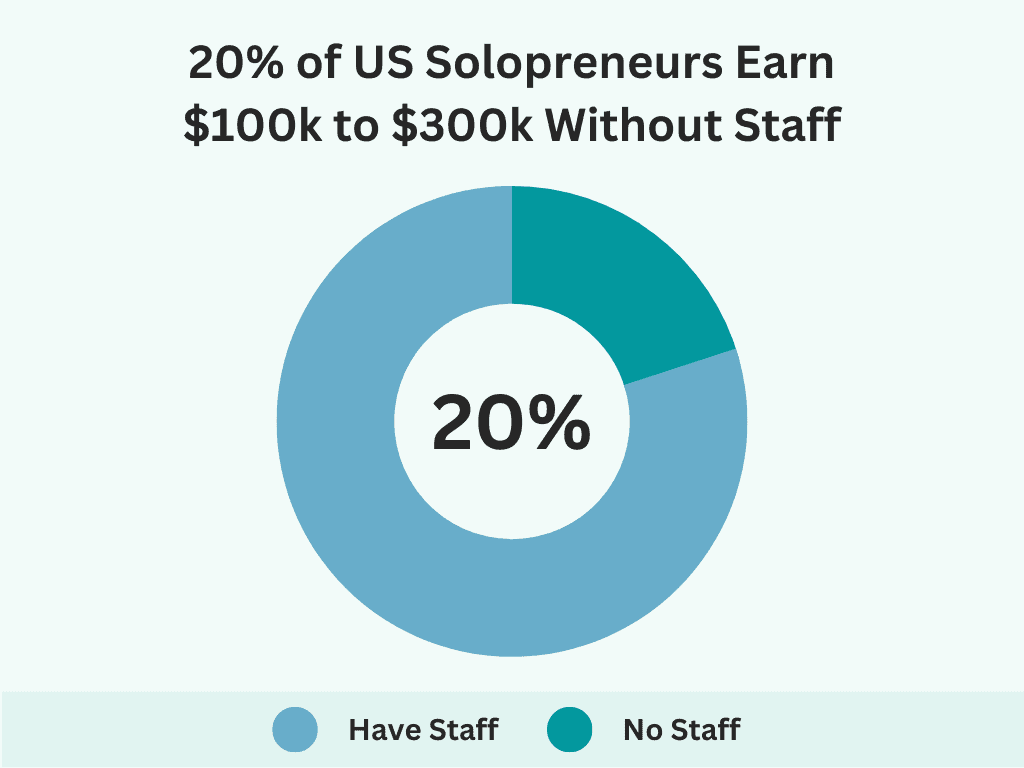
The highest-earning solopreneurs have typically developed deep specialization, clear positioning, and systemized operations that allow them to command premium rates for their work.
Interestingly, the research also reveals that solopreneurs earning more than $1 million annually typically employ at least one freelancer or part-timer. A hybrid approach works when you're outsourcing only what you need to.
9. Only a small percentage of solopreneurs earn more than $1 million per year
While substantial six-figure incomes are achievable for many solopreneurs, Leapmesh research shows that only 3.6% generate more than $1 million in annual revenue.
The rarity of seven-figure solopreneurs doesn't diminish the viability of this business approach.
Even at “just” $300,000-$500,000 in annual revenue, a well-structured solo business can provide exceptional income, freedom, and impact.
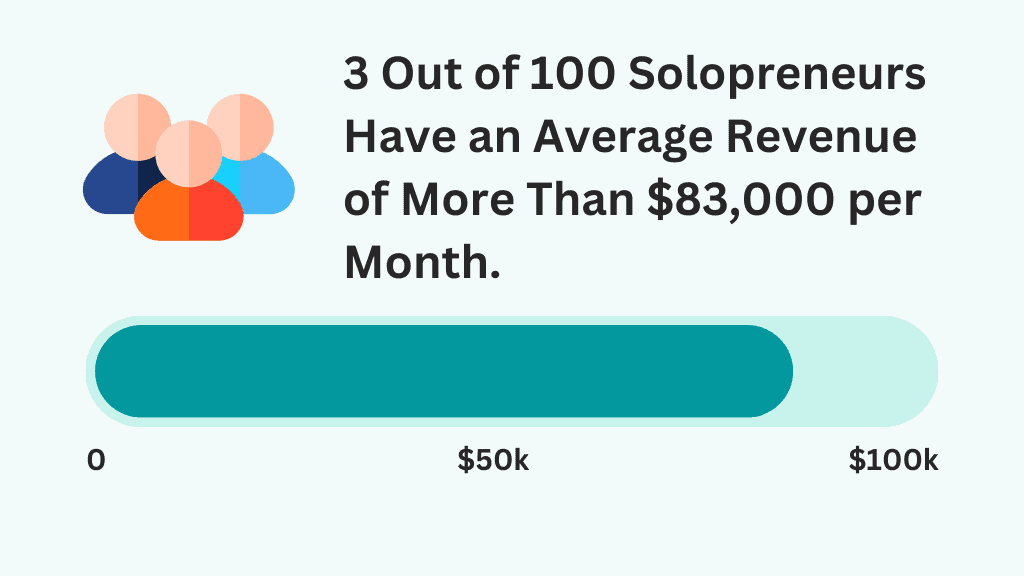
If you're determined to break the million-dollar barrier as a solopreneur, focus on creating leverage. This could include intellectual property (IP) or better offers.
10. Businesses-of-one are set to embrace AI
Artificial intelligence (AI) has become one of the core technologies in the business world—and solopreneurs are already taking advantage of it.
According to research from Collective, 78% of solopreneurs expect AI to change their operations, with 68% believing it will benefit their businesses.
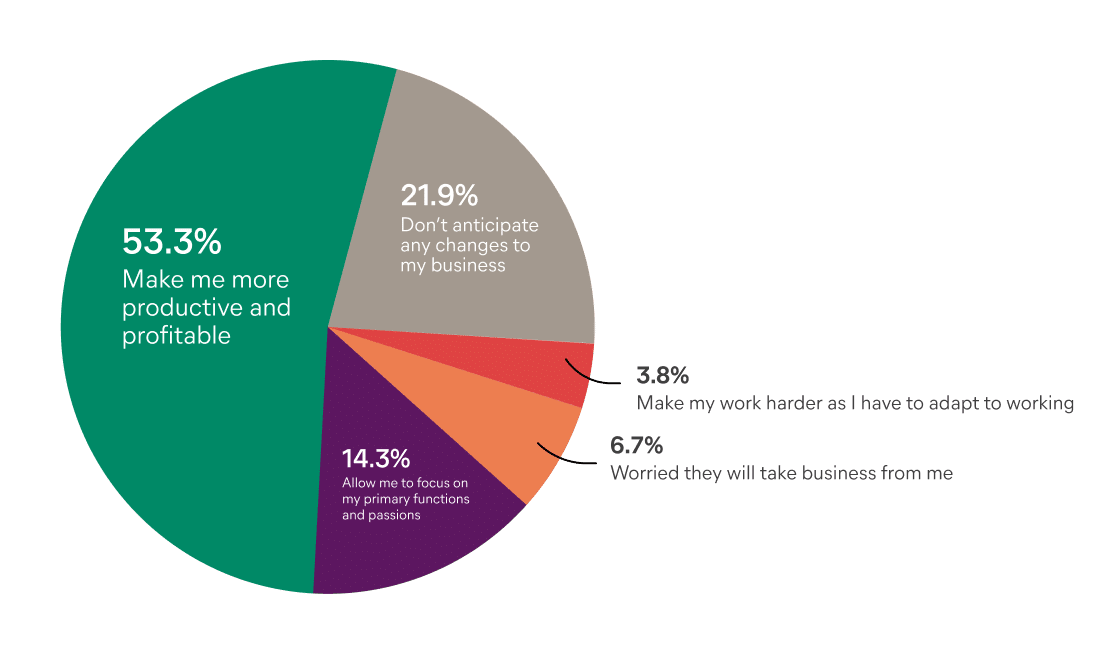
I've been watching this trend closely, and it makes perfect sense. As a solopreneur, your time is literally money. When you're handling everything yourself, you need tools that can multiply your impact without multiplying your effort. AI is perfectly positioned to provide that leverage.
That’s why you need to view it as an opportunity, not a threat.
The future of solopreneurship is bright
One thing is clear—solopreneurship is slowly becoming a mainstream career path for many employed folks. The numbers validate it and show us the potential of it.
If you're considering the solopreneur path or looking to optimize your existing solo business, now’s the time to make that leap.

